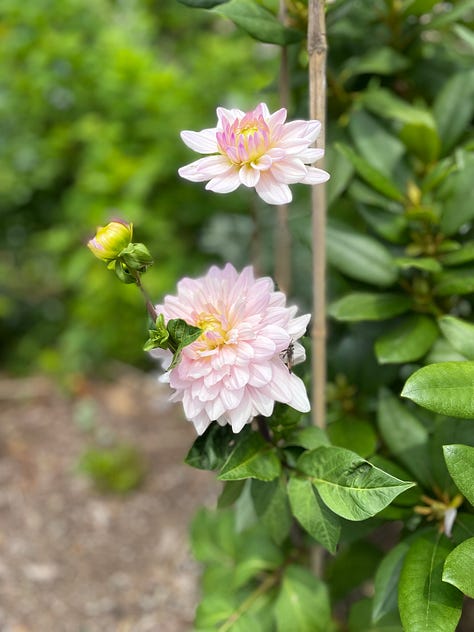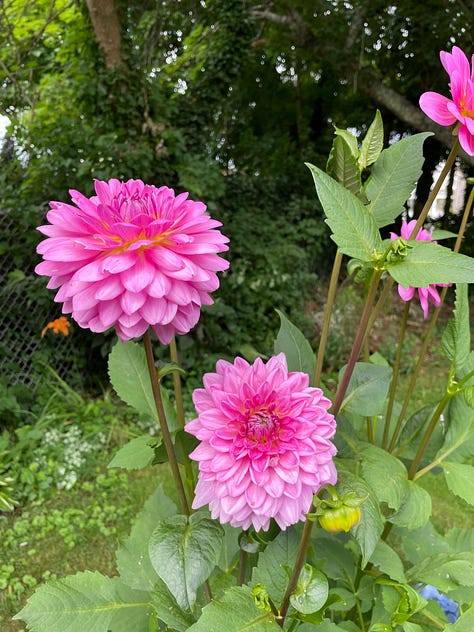It’s midsummer in Southeastern Massachusetts, and it’s been the summer of humidity. Bad for gardeners. Great for the plants…and the weeds. I’m outnumbered and overwhelmed.
It’s that point in the summer heat when I look around at the weeds taking over certain areas, and nature forces me to give in and rest.
I don’t spray my garden with herbicides or pesticides. I figure that nature will sort itself out if I nurture the biodiversity in my garden. Jim Putnam, a gardener on YouTube, mentioned a concept that I found fascinating. He said if he notices insects munching a plant, most often he does nothing and leaves it alone. Usually within a week, the natural predator of that insect arrives and takes care of it. Isn’t that cool? (Damaging infestations are different, of course.)
You can also grow companion plants next to each other, like calendula, which will attract and host bugs so they won’t bother your other crops. Or the opposite, many aromatic herbs are so strong, they naturally repel unwanted bugs, safeguarding the plants around them. My pepper plants have been destroyed by some insect this season, wiping out all the bottom leaves. But planted next to them, my basil and tomatoes look amazing. You win some, you lose some.
I try to yank out weeds manually, a little each day. But during the heat and humidity of midsummer, I can only handle so much… which is a good thing if you think about it. My limit creates possibilities and room for other things to thrive. How freeing.
Last year, I planted two liatris flanking a rose at the end of the season. I had forgotten about it, but when the tall stems began to wake this week, I marveled at what a genius I was to plan such balance and juxtaposition in form, color, and texture.
And then a rabbit came and chomped one of them down to nubs.

Ah, life. Now whenever I walk by the missing liatris, I smile begrudgingly, humbled by the knowledge that my effort was outdone by a rascally rabbit.
I imagine Beatrix Potter whispering to me, “The pests are muses, too.”
The garden is good for the control freak in us because we learn to roll with the losses and celebrate the small wins. The balance we seek is internal; the external balance in the garden comes from natural forces far greater than ourselves. We become participants, facilitators, guardians of nature.
Garden joy this week: Check out this video of my lavender hedge with bees bouncing on them. I swear there had to be like thirty of them at once! (Phenomenal Lavender is the only lavender I’ve had success with in my area. It’s amazing. If you’ve struggled growing with lavender in your area, try it.)
Sorry for the portrait orientation of the video. My oldest daughter is probably smiling and shaking her head because she’s a talented documentary film editor in CA, and I always forget to turn my camera to landscape.
Other garden pics of the week—my dahlias and hydrangeas are starting to bloom.









I’m still working on edits for my young adult Christmas manuscript. Yep, my mind is on Christmas in July. At least my imagination can help keep me cool along with my air conditioner.
My manuscript is suddenly changing from good to special. It’s hard to explain how this happens. It’s the point in the editing process where my original vision for the story is suddenly usurped by the depth of the characters. As I let go of my initial expectations and limitations, the story gains a slight wildness and raw beauty that I couldn’t have planned. I want my characters to surprise me—what’s the fun if I tell them what to do and they do it? I weed and shape and give the characters their wings, and the mystical force of storytelling, something far greater than myself, creates complex possibilities and emotional room for readers to find a piece of their own lives in the leaves of the pages. I become a participant, facilitator, guardian of story.
(Yes, I could apply this metaphor to teaching, but it’s summer, and I don’t want to think about the classroom yet…)




I love this: "The garden is good for the control freak in us because we learn to roll with the losses and celebrate the small wins. The balance we seek is internal; the external balance in the garden comes from natural forces far greater than ourselves. We become participants, facilitators, guardians of nature." It's so true for me. The garden is a patient and unwavering teacher.
I grew up on the East Coast. I miss my family but not the humidity. I wasn’t trying to brag though, just justifying my insane July garden projects. 😂